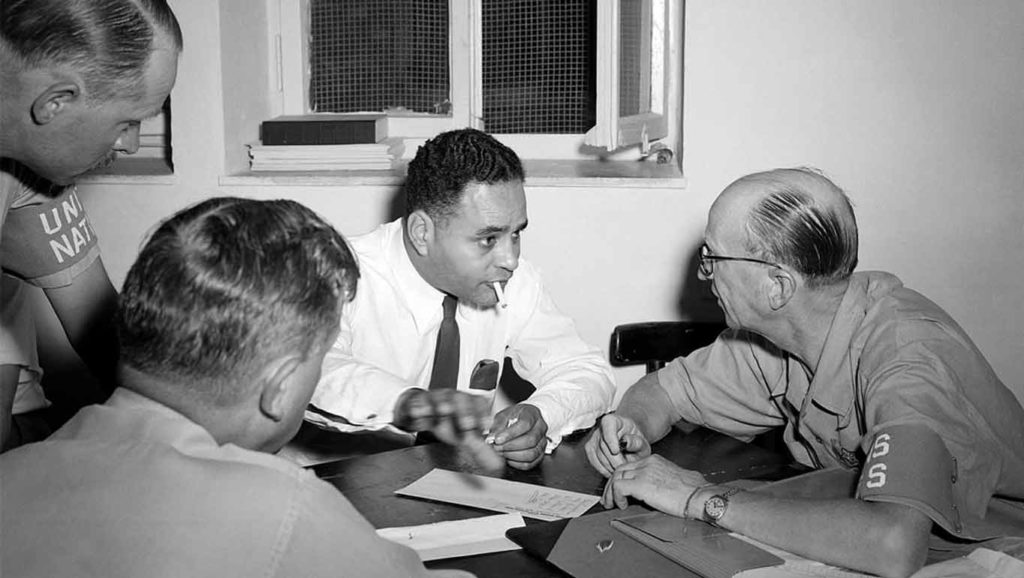Ralph Bunche personified the early United Nations. He was the first African American to receive a PhD in political science, the first Black person to win the Nobel Peace Prize, and he even presented an Academy Award. Every US president from Truman to Nixon courted him for high office. But today, outside of UN circles, he is largely forgotten.
In a new biography, ‘The Absolutely Indispensable Man: Ralph Bunche, the United Nations, and the Fight to End Empire’ (Oxford University Press, 2022), Kal Raustiala breathes new life into an underappreciated story. In his lifetime, Bunche achieved celebrity status as the most prominent American in the UN. As a State Department Africanist during the Second World War, he participated in the conferences that birthed the UN, and then shepherded the Trusteeship Division, working for peaceful decolonization. He pioneered UN peacekeeping and the role of multilateral mediator, rising to become Under-Secretary-General for Special Political Affairs and principal adviser to Secretaries-General Hammarskjöld and Thant. Given these achievements, no one, including Raustiala, has a clear answer to why Bunche rarely appears in the pantheon of great diplomats of the early postwar, but we should not discount the role of racial discrimination.
Choosing the UN
Raustiala’s vivid, if long, account of Bunche’s professional life depicts an American patriot with an internationalist core. Bunche formally left the State Department to join the UN’s permanent staff in 1947. In the 1950s, he stood out for wholeheartedly choosing the UN, even as skepticism toward the fledgling body took hold on the American political right. Yet, he did not detach himself from domestic politics in the way we might expect from an international civil servant today. He believed in the deep connection between domestic racial justice and international human rights, and served on the board of the NAACP, the African American advocacy group, for twenty-two years.
Scholar-diplomat
Among its many attributes, this biography frames race as central to world politics (and the academic discipline of international relations), personalized through Bunche’s own evolving ideas and writings on race in America and abroad. He was a scholar-diplomat of a bygone era: “radical in thought, pragmatic in action,” as Raustiala described him at a recent book talk. Academic fieldwork on French rule in West Africa shaped Bunche’s mission to modernize societies through decolonization, rooted in egalitarianism, peaceful processes, and long-term commitment to African peoples.
To support the trusteeship process he helped design, he conceived a new way to deploy soldiers not long after the world war had ended: with impartiality, consent of the parties, and with limited or no use of force, under a new set of principles that the Charter had not explicitly envisaged. In this act of bureaucratic creativity, peacekeeping was born.
As Raustiala has noted, this book does not systematically analyze the end of empire or the process by which colonial powers transferred their rule to local populations. Nevertheless, Bunche contributed two central tools to help the UN smooth the path of decolonization: peacekeeping, as in the early cases of UNTSO (the UN Truce Supervision Organization) in Palestine from 1948 and UNEF (the UN Emergency Force) in Egypt after the 1956 Suez Crisis; and, secondly, UN conflict mediation. Mediation was itself not new, but Bunche became the first UN official to demonstrate the major benefits of the organization’s impartiality as mediator. In the Middle East, and especially after the assassination of his predecessor as mediator in Palestine, Bunche brought negotiators to the Greek island of Rhodes to force progress away from the heat of the battlefield, for which he received the Nobel Prize.

Enduring legacy
Like all good biographers, Raustiala tackles questions of legacy. Bunche’s creations, above all peacekeeping, live on with minimal attachment to his name; he never sought personal fame for his inventions. The fact that the Trusteeship Council wrapped up its assignment by 1994, the only principal organ of the UN to have done so, speaks to the remarkable speed of decolonization. Meanwhile, UNTSO, the first peacekeeping mission, continues to operate. This year, it will mark its seventy-fifth anniversary, a testament to the ongoing relevance of Bunche’s invention, but also the challenges of defining success and bringing peacekeeping operations to an end.
In Washington, DC, Bunche’s legacy is infused through the institutions that shaped him, and that he helped to shape, including Howard University’s Ralph Bunche Center. As Raustiala notes, the State Department “makes the most” of Bunche’s relatively brief tenure there, with its library named for this consummate scholar-diplomat. In fact, Bunche demurred repeatedly when successive presidents asked him to return to serve at the highest levels of the US government. At today’s critical juncture for the United Nations, Dr. Ralph J. Bunche’s ideas and actions deserve much more recognition beyond these places of education and diplomacy. Raustiala’s biography helps to provide just that.



